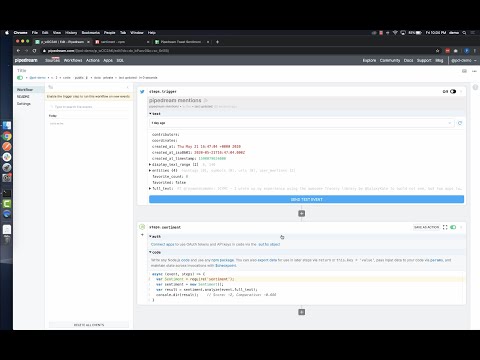What do you want to automate
with Google Sheets and Ninox?
Prompt, edit and deploy AI agents that connect to Google Sheets, Ninox and 3,000+ other apps in seconds.
Trusted by 1,000,000+ developers from startups to Fortune 500 companies
Popular Google Sheets and Ninox Triggers#
Popular Google Sheets and Ninox Actions#
Add a single row of data to Google Sheets. Optionally insert the row at a specific index (e.g., row 2 to insert after headers, shifting existing data down). See the documentation
Add multiple rows of data to a Google Sheet. See the documentation
Get all values or values from a range of cells using A1 notation. See the documentation
Create conditional formatting with color scales or custom formulas. See the documentation
Overview of Google Sheets#
The Google Sheets API allows for the creation, reading, updating, and deletion of data within Google Sheets, enabling a robust platform for spreadsheet management and data manipulation. Through Pipedream, you can craft serverless workflows that respond to various triggers, such as webhook events, emails, or scheduled times, to interact with Google Sheets. This synergy can automate reporting, synchronize data across applications, manage inventory, track leads in a CRM, or even conduct survey analysis by updating and retrieving sheet data on the fly.
Connect Google Sheets#
import { axios } from "@pipedream/platform"
export default defineComponent({
props: {
google_sheets: {
type: "app",
app: "google_sheets",
}
},
async run({steps, $}) {
return await axios($, {
url: `https://www.googleapis.com/oauth2/v1/userinfo`,
headers: {
Authorization: `Bearer ${this.google_sheets.$auth.oauth_access_token}`,
},
})
},
})
Overview of Ninox#
The Ninox API allows you to interact programmatically with the Ninox database platform. By harnessing this API via Pipedream, you can automate data entry, synchronize databases with other apps, and trigger actions based on specific events within your Ninox tables. It facilitates bidirectional communication, ensuring your data flows seamlessly between Ninox and other services in your tech stack. From sending notifications based on Ninox triggers to processing and analyzing data from other sources within Ninox, the possibilities are extensive.
Connect Ninox#
import { axios } from "@pipedream/platform"
export default defineComponent({
props: {
ninox: {
type: "app",
app: "ninox",
}
},
async run({steps, $}) {
return await axios($, {
url: `https://api.ninox.com/v1/teams`,
headers: {
Authorization: `Bearer ${this.ninox.$auth.api_key}`,
"Content-Type": `application/json`,
},
})
},
})
Related Videos#



Community Posts#


